Up to 50% of patients with acute myeloid leukemia (AML) have a genetic alteration called DNA methylation, in which a carbon methyl group is added to the DNA molecule, typically turning the methylated gene "off." A mainstay of therapy is the use of hypomethylating agents, which prevent copying of these modifications during cell division, but this therapy is effective in only 20-30% of patients. Using chemical and genetic manipulation in mouse bone marrow, Dr. Viny [Damon Runyon-Doris Duke Clinical Investigator] aims to determine the effect of DNA methylation on the ability of specific regions of the genome to be accessible to proteins involved with gene expression and other regions to be inaccessible and "silenced." In a prospective phase II clinical trial, he will treat relapsed AML patients with dual hypomethylating agents. By studying these patients' genetic profiles, he aims to determine the genetic features that contribute to therapy response, paving the way for more effective interventions to be developed for patients with acute myeloid leukemia. Dr. Viny was previously a Damon Runyon Fellow.
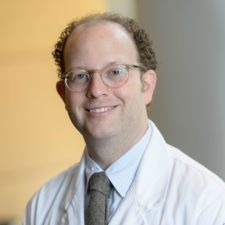

The microorganisms that live in the digestive tract, also known as the intestinal microbiome, have emerged as important factors in patients' response to cancer therapy. Studies have found that the intestinal microbiome can modulate the anti-tumor immune response to several types of therapy, including chimeric antigen receptor T cell (CAR T cell) therapy, in which a patient's own immune cells are genetically modified to target their cancer. CAR T therapy has led to unprecedented responses in patients with high-risk blood cancers such as leukemia and lymphoma. However, patients may experience disease relapse or CAR-mediated toxicities. Dr. Smith has found that responses to CAR T therapy are linked to alterations in and abundances of the intestinal microbiome. Her research will investigate how the intestinal microbiome mediates this impact on CAR T cells. Dr. Smith was previously a Damon Runyon Physician-Scientist, a complementary award program designed for clinicians interested in research to acquire the skills needed to become physician-scientists.
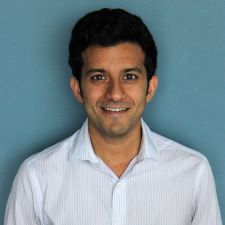
Chimeric antigen receptor T cell (CAR T cell) therapy, in which a patient's own immune cells are engineered to target their cancer, has changed the treatment landscape for many blood cancers. Despite promising early results, however, long-term follow-up has revealed that nearly half of patients treated with CAR T cells eventually experience cancer recurrence. Using a variety of techniques in cell lines and patient samples, Dr. Singh [Bakewell Foundation Clinical Investigator] aims to understand how interactions between engineered T cells and blood cancer cells in some cases lead to long-term remission, and in others to therapeutic failure. The broad goals of his lab are to understand the biological signals that cause these therapies to fail, and to use this knowledge to design next-generation immunotherapies that can cure more patients.
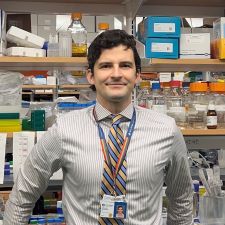
Acute myeloid leukemia (AML) with rearrangements of the KMT2A gene (KMT2A-r) or NPM1 mutation (NPM1m) affect children and adults and can be difficult to treat even with highly intensive therapy. Targeted, less toxic therapies are urgently needed. Menin inhibitors are novel small molecules that block a critical interaction between the KMT2A protein and another protein called menin. This protein-protein interaction is essential in sustaining both KMT2A-r and NPM1m AML. Menin inhibitors have now entered clinical trials for children and adults have shown promising results. However, it has also been demonstrated that up to 40% of patients will develop resistance to a menin inhibitor when it is given alone due to a mutation in the MEN1 gene, which encodes the protein menin. Dr. Bourgeois is investigating whether combination therapy can prevent or overcome MEN1 mutations that confer resistance to menin inhibitors. Additionally, he is developing models to understand how and why resistance to menin inhibitors is sometimes driven by MEN1 mutations, but other times not. The overarching goal of the project is to identify combination therapies that prevent and overcome menin inhibitor resistance and to better understand the different ways in which resistance to menin inhibitors develops.
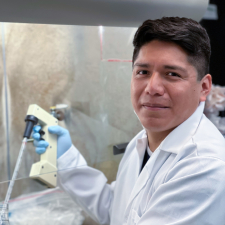
Human cells compact their vast genomes into the small confines of the nucleus by wrapping their DNA into a highly complex structure called chromatin. Packaging DNA into chromatin, however, affects all nucleic acid-transacting machines (e.g., transcription factors) that need to access the genomic information stored in the DNA. NuRD is a large multi-subunit protein complex that plays a major role in making chromatin either accessible or inaccessible. Dysregulation of NuRD and aberrant targeting of the complex can result in the emergence of several types of cancers, including breast, liver, lung, blood, and prostate cancers. Dr. Osorio Valeriano’s [Philip O'Bryan Montgomery, Jr., MD, Fellow] work will reveal mechanistic aspects of NuRD-mediated chromatin regulation and pave the way for the development of novel therapeutic approaches that target cancers more effectively. Dr. Osorio Valeriano received his PhD from Philipps University and his MSc and BSc from the National Autonomous University of Mexico.
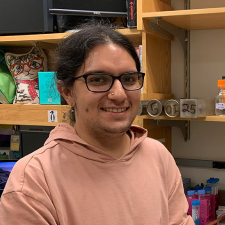
In addition to acute illness, viruses can cause cancers. While our understanding of cellular immunity against viruses that have DNA-based genomes is robust, we know less about how cells protect themselves against RNA-based viruses such as hepatitis C, a leading cause of liver cancer. Because many cellular defenses against viruses are known to be shared between mammals and bacteria, Dr. Mendoza [HHMI Fellow] is looking for new cellular defenses against RNA viruses in bacteria and will investigate how these defenses work. The resulting discovery of anti-viral defenses will broaden our understanding of how cells protect themselves against RNA viruses, which will improve our capacity to support patients' immune systems when infected with cancer-causing RNA viruses. Dr. Mendoza received their PhD from the University of California, San Francisco, and their BS from the University of Miami.
Cancer cells rely on efficient uptake, conversion, and exchange of nutrients and vitamins to support their rapid growth and survival. The molecular transport channels that allow passage of nutrients between the different cellular compartments are critical for the survival of cancer cells and are thus promising as potential drug targets. However, drug discovery efforts are hampered by a lack of basic understanding of these channels' identities, functions, and regulation inside cancer cells. Dr. Kory's research aims to identify transporters central to cancer cell nutrient supply and detoxification pathways and determine their role in the emergence, survival, and aggressiveness of cancer. Her research is relevant to all cancers, but particularly pediatric, blood, and breast cancers.

Myeloid neoplasms (MN), including acute myeloid leukemia and myelodysplastic syndrome, are lethal blood cancers. The genetic mutations in the blood that lead to MN can occur years before diagnosis and maintain almost normal function before transformation. Certain mutations, including those in the gene IDH2, have been identified as high-risk for developing MN. Individuals with a reduction in the number of mature blood cells (cytopenias) who harbor acquired mutations in their blood, yet do not meet criteria for a cancer diagnosis, have a condition called cytopenias of undetermined significance (CCUS). These individuals almost invariably develop MN. Dr. Bolton will conduct a clinical trial to evaluate whether the IDH2 inhibitor enasidenib can be used as a therapy for CCUS. She will assess mechanisms of resistance and determine whether enasidenib can prevent the development of MN. This represents the first use of genetically targeted therapy for cancer prevention.

Blood stem cells, which give rise to various blood cells in the body, acquire mutations with increasing frequency as we age. In the absence of blood cancer development, this state is called clonal hematopoiesis. Up to a quarter of individuals over 60 years old will have recurrent mutations detected in their blood. Recent studies suggest that those with clonal hematopoiesis have an increased risk of developing heart disease and blood cancer, as well as increased levels of inflammatory cytokines – signaling molecules released by immune cells to promote inflammation. Dr. Kim will dissect the mechanisms underlying increased inflammation, which could provide insight into various inflammatory conditions associated with clonal hematopoiesis and potentially elucidate how clonal hematopoiesis progresses into blood cancer.
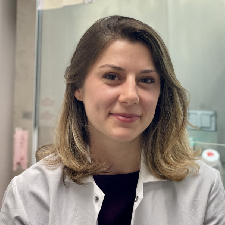
Myelodysplasia and acute myeloid leukemia are blood cancers with a poor prognosis. At the root of these malignancies are cells harboring mutant forms of proteins with dysfunctional activity which results in abnormal cell behavior and drives disease progression. The focus of my project is the development of new therapeutics that precisely identify cells with mutant forms of the proteins and, by harnessing their aberrant biological activity, causes those cells to self-destruct. These selective therapeutics will be able to kill cancer cells but leave the healthy cells intact proving more effective and having less side-effects than the chemotherapies currently in use.
